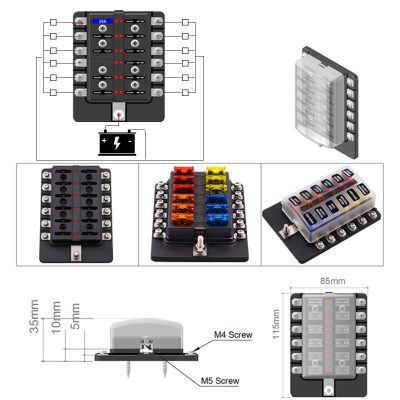The Vital Role of Automotive Fuses in Safeguarding Alternators and Voltage Regulators for Optimal Vehicle Performance
News 2025-10-13
Car fuses play a crucial role in the electrical systems of vehicles, particularly in protecting components like the alternator and voltage regulators. These fuses act as safety devices that prevent damage from electrical overloads or short circuits, ensuring the longevity and reliability of the vehicle’s charging system. In modern cars, the alternator generates electricity to power the battery and electrical accessories, while voltage regulators maintain stable output. Fuses are essential in this setup, as they interrupt current flow during faults, avoiding costly repairs and potential hazards. Understanding their function helps in maintaining vehicle safety and efficiency.

Applications in Vehicle Electrical Systems
Fuses are widely used in automotive applications to protect sensitive components such as alternators and voltage regulators. In the alternator system, fuses safeguard against high current draws that could occur from faulty wiring or component failures, common in high-demand scenarios like heavy traffic or accessory use. Voltage regulators, which control the alternator’s output to prevent overcharging the battery, rely on fuses to isolate issues without affecting the entire electrical network. This protection is critical in electric and hybrid vehicles, where complex systems demand precise current management to avoid inefficiencies and ensure smooth operation during daily commutes or long trips.
Key Performance Advantages
Automotive fuses offer significant benefits in terms of reliability and safety for alternators and voltage regulators. They provide rapid response to overcurrent situations, often blowing within milliseconds to prevent heat buildup and potential fires, which is vital for components operating under high electrical loads. Fuses are also cost-effective, with standardized sizes and ratings that make them easy to replace, reducing downtime and maintenance costs. Their durability in harsh environments, such as extreme temperatures and vibrations, ensures consistent performance, enhancing the overall lifespan of the vehicle’s electrical system and contributing to better fuel efficiency and reduced emissions in contemporary automotive designs.
Frequently Asked Questions
1. What is the main function of a car fuse in an alternator system?
It protects the alternator and connected circuits by breaking the circuit during excessive current, preventing damage from overloads or shorts.
2. How do fuses interact with voltage regulators in a vehicle?
Fuses work alongside voltage regulators to isolate faults, ensuring that any surge or failure doesn’t compromise the regulator’s ability to maintain stable voltage output.
3. What signs indicate a blown fuse in a car’s electrical system?
Common signs include dimming lights, non-functional accessories, or warning lights on the dashboard, signaling a need for immediate inspection and replacement.


